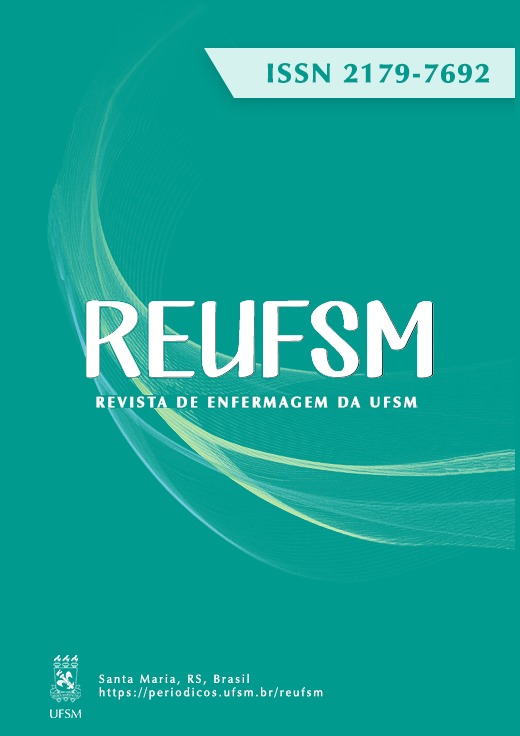Reflections on the legacies of the Middle Ages in coping with the COVID-19 pandemic
DOI:
https://doi.org/10.5902/2179769267675Keywords:
COVID-19, Pandemics, History, Medieval, Science, Technology and Society, PhilosophyAbstract
Objective: to reflect on the legacies of the Middle Ages during the COVID-19 pandemic. Method: a reflection study on theoretical-philosophical aspects related to legacies of the Middle Ages and to the COVID-19 pandemic and was developed during an academic discipline in a graduate program in Nursing from a public university between September and December 2021. Results: humanity experienced countless changes over the centuries, resulting from several challenges that the populations had to face: wars, epidemics and even economic crises. These adversities were interconnected with cause-consequence. The health area had to advance to cope with these obstacles and allow people to resume their lives with the fewest possible impacts. Conclusion: the Middle Ages was a pioneer era in facing pandemics and left references currently used against COVID-19, such as hygiene measures, use of Personal Protective Equipment and social isolation, in addition to denial behaviors reminding us of the Dark Ages.
Downloads
References
Morens DM, Daszak P, Markel H, Taubenberger J. Pandemic COVID-19 Joins history's pandemic legion. mBio. 2020;11(3):e00812-20. doi: 10.1128/mBio.00812
Riboli E, Arthur JP, Mantovani MF. In the epicenter of the epidemic: a look at Covid-19 in Italy. Cogitare Enferm. 2020;25:e72955. doi: 10.5380/ce.v25i0.72955
Sánchez OP, Bermejo PMB. Brotes, epidemias, eventos y otros términos epidemiológicos de uso cotidiano. Rev Cuba Salud Pública [Internet]. 2020 [acceso en 2021 jul 31];46(2):e2358. Disponible en: https://www.scielosp.org/article/rcsp/2020.v46n2/e2358/
Fernandes AC. As grandes pandemias da história da Europa e os seus impactos na nossa civilização: desafios da moderna saúde pública. Cad Ibero Am Direito Sanit (Impr). 2021;10(2):19-30. doi: 10.17566/ciads.v10i2.780.
Conti AA. Protective face masks though centuries from XVII century plague doctors to current health care professionals managing the COVID-19 pandemic. Acta Biomed. 2020;91(4):e2020124. doi: 10.23750/abm.v91i4.10231
Cardoso EAO, Silva BCA, Santos JH, Lotério LS, Accoroni AG, Santos MA. The effect of suppressing funeral rituals during the COVID-19 pandemic on bereaved families. Rev Latinoam Enferm. 2020;28:e3361. doi: 10.1590/1518-8345.4519.3361
Sanches MA, Lovo OA, Sanches LC. Religião e epidemias na história: do essencial ao perverso. Rever. 2020;20(2). doi: 10.23925/1677-1222.2020vol20i2a10
Ehrenreich B, English D. Bruxas, parteiras e enfermeiras: uma história de mulheres curandeiras. New York (NY): The Feminist Press; 1973.
Chauí M. Convite à Filosofia. 14ª ed. São Paulo: Ática Didáticos; 2019.
Strock A. Filosofia medieval. Rio de Janeiro (RJ): Zahar; 2003.
NetNature; Rossetti V. História da ciência: o método científico na Idade Média. 2017 [acesso em 2021 jul 21]. Disponível em: https://netnature.wordpress.com/2017/12/11/historia-da-ciencia-o-metodo-cientifico-na-idade-media
Buckingham W. O livro da filosofia. 2ª ed. São Paulo (SP): Globo; 2011.
Theologica Latinoamericana: enciclopédia digital; Miatello A. Cristianismo medieval [Internet]. Belo Horizonte: UFMG/GABE; 2015 [acesso em 2021 jul 21]. Disponível em: http://teologicalatinoamericana.com/?p=592
Ranhel AS. História do corpo na idade média: representações, símbolos e cultura. Veredas da História [Internet]. 2018 [citado em 2021 jul 31];11(1):10-31. Disponível em: https://periodicos.ufba.br/index.php/rvh/article/view/47892
Ariès P. História da morte no ocidente: da idade média aos nossos tempos. Ed. Especial. Rio de Janeiro (RJ): Nova Fronteira; 2017.
Laplantine F. Antropologia da doença. 4ª ed. São Paulo (SP): WMF Martins Fontes; 2010.
Russell JB, Alexander B. História da bruxaria. São Paulo (SP): Aleph; 2008.
Szasz TS. A fábrica da loucura. Belo Horizonte: Zahar; 1978.
Conti AA. Historical and methodological highlights of quarantine measures:from ancient plague epidemics to current coronavirus disease (COVID-19) pandemic. Acta Biomed. 2020;91(2):226-9. doi: 10.23750/abm.v91i2.9494
Barbieri R, Signoli M, Chevé D, Costedoat C, Tzortzis S, Aboudharam G, et al. Yersinia pestis: the natural history of plague. Clin Microbiol Rev. 2020;34(1):e00044-19. doi:10.1128/CMR.00044-19
Aquino EML, Silveira IH, Pescarini JM, Aquino R, Souza-Filho JA, Rocha AS, et al. Social distancing measures to control the COVID-19 pandemic: potential impacts and challenges in Brazil. Ciênc Saúde Colet. 2020;25(Suppl 1):2423-46. doi: 10.1590/1413-81232020256.1.10502020
Schmidt B, Crepaldi MA, Bolze SDA, Neiva-Silva L, Demenech LM. Saúde mental e intervenções psicológicas diante da pandemia do novo coronavírus (COVID-19). Estud Psicol. 2020;37:e200063. doi: 10.1590/1982-0275202037e200063
Barros MBA, Lima MG, Malta DC, Szwarcwald CL, Azevedo RCS, Romero D, et al. Relato de tristeza/depressão, nervosismo/ansiedade e problemas de sono na população adulta brasileira durante a pandemia de COVID-19. Epidemiol Serv Saúde. 2020;29(4):e2020427. doi: 10.1590/S1679-49742020000400018
Faro A, Bahiano MA, Nakano TC, Reis C, Silva BFP, Vitti LS. COVID-19 e saúde mental: a emergência do cuidado. Estud Psicol. 2020;37:e200074. doi:10.1590/1982-0275202037e200074
Costa NNG, Servo MLS, Figueredo WN. COVID-19 and the occupational stress experienced by health professionals in the hospital contexto: integrative review. Rev Bras Enferm. 2022;75(Suppl 1). doi: https://doi.org/10.1590/0034-7167-2020-0859
Published
How to Cite
Issue
Section
License
Copyright (c) 2022 Revista de Enfermagem da UFSM

This work is licensed under a Creative Commons Attribution-NonCommercial-ShareAlike 4.0 International License.
This work is licensed under a Creative Commons Attribution-NonCommercial-ShareAlike 4.0 International License.








